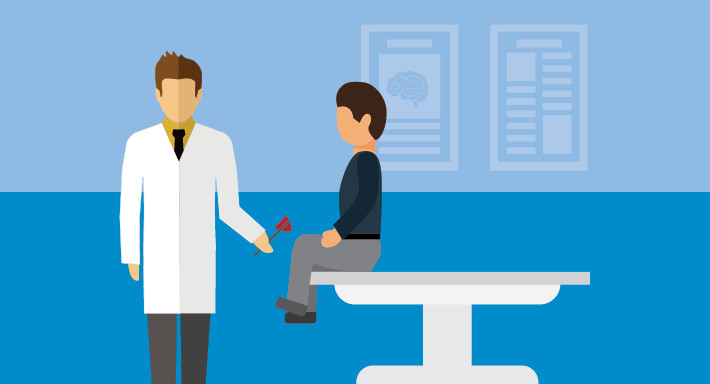A Neurological Doctor, also known as a neurologist, is a medical expert who specializes in the intricate world of the nervous system. This system, encompassing the brain, spinal cord, and peripheral nerves, is crucial for controlling and coordinating your body’s functions. Neurological doctors are rigorously trained to diagnose, treat, and manage a wide spectrum of conditions affecting this vital system. These conditions range from common ailments like migraines to complex disorders such as Alzheimer’s disease, epilepsy, stroke, Parkinson’s disease, and multiple sclerosis.
For children, a specialized pediatric neurological doctor focuses on neurological disorders from infancy through adolescence. While some conditions overlap with adult neurology, such as epilepsy and migraines, pediatric neurologists are also experts in conditions unique to children, including neurogenetic disorders and developmental issues. Whether adult or child, a neurological doctor plays a pivotal role in addressing a vast array of neurological health concerns.
What Neurological Doctors Do: Diagnosis, Testing, and Procedures
Expert Diagnosis Through Neurological Examination
Neurological doctors are masters of clinical diagnosis. Their expertise begins with a detailed understanding of a patient’s medical history and a comprehensive neurological examination. This examination is a cornerstone of their practice, even with advancements in medical technology. It involves a careful assessment of mental status, vision, speech, strength, sensation, coordination, reflexes, and gait. This meticulous approach allows a neurological doctor to pinpoint the location and nature of neurological problems, often before advanced tests are even conducted.
Utilizing Advanced Neurological Tests
To further refine diagnoses and understand the complexities of neurological conditions, neurological doctors employ a range of sophisticated tests. These tests provide detailed insights into the structure and function of the nervous system:
- Computed Tomography (CT) or Computer-Assisted Tomography (CAT) scans: These imaging techniques use X-rays to create cross-sectional images of the brain and spinal cord, helping to identify structural abnormalities.
- Magnetic Resonance Imaging (MRI): MRI uses powerful magnets and radio waves to produce detailed images of the brain, spinal cord, and nerves. It is particularly useful for detecting soft tissue damage and subtle changes not visible on CT scans.
- Electroencephalography (EEG): EEG measures the electrical activity of the brain using electrodes placed on the scalp. It is primarily used to diagnose and monitor epilepsy and other seizure disorders.
- Nerve Conduction Studies and Electromyography (NCS/EMG): These tests assess the function of peripheral nerves and muscles. NCS measures the speed and efficiency of electrical signals traveling along nerves, while EMG evaluates the electrical activity of muscles. They are crucial for diagnosing nerve and muscle disorders.
- Lumbar Puncture (LP) for Cerebral Spinal Fluid Analysis: In this procedure, a needle is inserted into the lower back to collect cerebrospinal fluid (CSF), the fluid surrounding the brain and spinal cord. Analyzing CSF can help diagnose infections, inflammation, and other conditions affecting the nervous system.
Procedures Performed by Neurological Doctors
While neurological doctors are not surgeons – that’s the domain of neurosurgeons – they do perform a variety of procedures as part of patient care. Neurologists and neurosurgeons often collaborate closely, even working together in surgical settings for certain conditions.
General neurological doctors routinely perform procedures such as lumbar punctures and NCS/EMG tests. Neurologists with specialized subspecialty training may also perform more advanced procedures, including:
- Intraoperative Brain and Spine Monitoring: Monitoring nervous system function during surgery to prevent damage.
- Autonomic Testing: Evaluating the autonomic nervous system, which controls involuntary functions like heart rate and blood pressure.
- Endovascular Procedures: Minimally invasive procedures performed inside blood vessels, such as angiograms to visualize blood vessels and coiling of aneurysms to prevent rupture.
- Botulinum Toxin Injections: Therapeutic injections for conditions like migraines, dystonia, and spasticity.
- Skin and Muscle Biopsies: Collecting tissue samples for diagnostic purposes in certain neurological and neuromuscular conditions.
Neurological doctors are at the forefront of diagnosing and managing a wide range of debilitating conditions. Their expertise in the nervous system, combined with advanced diagnostic and procedural skills, makes them indispensable in modern healthcare.
 Global collaboration and impact in neurology
Global collaboration and impact in neurology
 Join the field of neurological doctors
Join the field of neurological doctors
 Pediatric neurological doctor examining a child
Pediatric neurological doctor examining a child
 Neurological doctors making a difference in healthcare
Neurological doctors making a difference in healthcare
Conclusion: The Vital Role of Neurological Doctors
In conclusion, a neurological doctor is a critical specialist in the medical field, dedicated to the diagnosis, treatment, and management of disorders affecting the nervous system. From performing detailed neurological exams to utilizing advanced tests and procedures, these highly trained physicians offer comprehensive care for patients of all ages. Whether addressing common conditions or tackling rare and complex disorders, neurological doctors improve the lives of countless individuals by safeguarding the health of their nervous systems. Their expertise and commitment are essential for navigating the complexities of neurological health and ensuring better outcomes for patients facing these challenging conditions.
